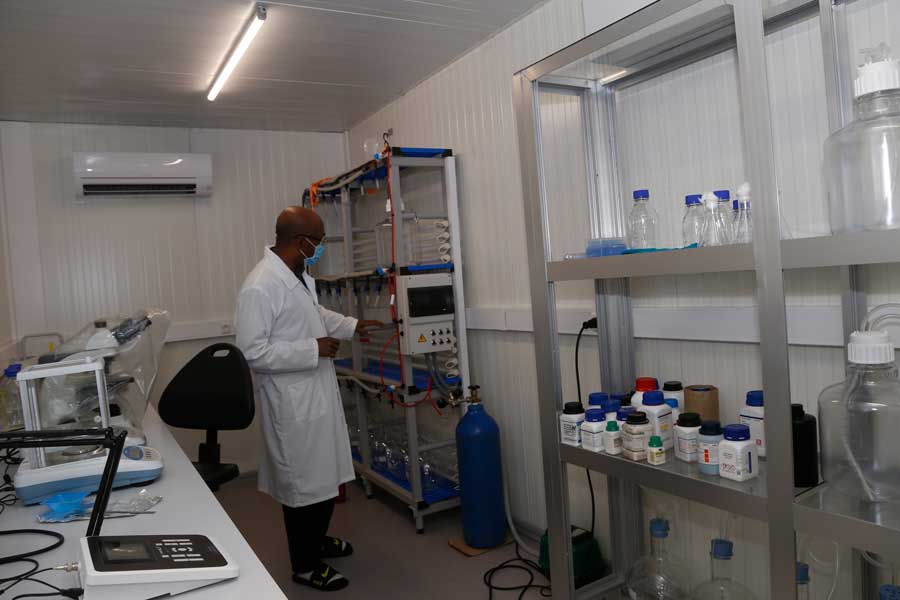
Commentaries | Mar 26,2022
May 23 , 2020
By HENOK TERECHA ( FORTUNE STAFF WRITER )
In a bid to address the scarcity of N95 respirators, Addis Abeba University's Institute of Technology has started reprocessing used masks using an ultraviolet or UV light decontamination process.
With the capacity to reprocess 5,000 N95 respirators a day using a high-output UV–C decontamination chamber, the Institute takes five minutes to complete the decontamination. N95 respirators are face masks used by both medical professionals and the broader public during the current Novel Coronavirus (COVID-19) pandemic that meet criteria set out by a US government regulatory agency to filter out 95pc of airborne particles.
Thomas Baer (MD), a medicine specialist, and his team at the Stanford Photonics Research Center and Optical Society Foundation have developed and prototyped a UV-C chamber, which can be used for rapid decontamination and reprocessing of N95s.
The chamber uses 90cm-long germicidal lamps that produce UV light and are mounted to the back and doors of a metal chamber. The bulbs are spaced 23cm apart and are located in upper and lower banks; each bank has eight lights. The chamber includes a power meter for testing the lamps' irradiance.
The Institute is set to start the process of reprocessing the masks after securing a 4,500-dollar grant from the Optical Society Association (OSA), an association of individuals and companies with an interest in optics and photonics. The funding came through Lifebox, an organisation devoted to safe surgery and anaesthesia in low-resource countries.
The grant was used to cover the costs of the parts to reprocess the masks, such as the metal chamber, germicidal lamp fixtures, replacement lamps, nuts to attach UV-C lamps to the metal chamber and electrical wire nuts. The Institute will also assign one person to follow up on the process. Production is expected to start in the coming few weeks.
The institute prepared tools such as variable size drills, screwdrivers and a hot melt glue gun, according to Esayas G. Yohannes (PhD), executive director at the Institute.
The Institute is also producing intubation caving, a tube inserted in patients to connect with a ventilator to assist them with breathing, to distribute to hospitals. It is also producing bubble helmets for healthcare workers to protect them from the virus.
OSA proposes the construction and implementation of the UV-C reprocessing chamber in Ethiopia. Addis Abeba University is in charge of procuring the materials and constructing the chamber. At the same time, St. Peter’s Specialised Hospital deals with ensuring the masks are ready for use, developing clinical use protocols, and will take the lead in using the reprocessed masks.
“We're observing that the number of positive cases is increasing in Ethiopia, so the country needs a lot of face masks, especially the N95 masks for healthcare workers," said Esayas.
Healthcare workers who perform aerosol-generating activities such as intubation and anaesthesia and emergency care providers are at the highest risk of exposure and require aerosol protection with N95 masks or other aerosol respirators. However, N95 masks are critically limited, especially in low-resource environments such as Ethiopia.
Technological solutions such as these will play a significant role in controlling the virus, according to Zewdu Assefa, deputy incident manager of the Public Health Emergency Operations Centers for COVID-19 Preparedness & Response under the Ethiopian Public Health Institute.
“It is helpful to fill the gap in the high scarcity of COVID-19 protective materials needed by healthcare workers in the fight against the pandemic.” However Zewdu also added “provided that the new technologies and innovations pass through and get certification from the regulatory bodies of the country and in line with the national COVID-19 infection prevention and control protocol.”
N95 masks are very costly and is not available everywhere, and decontaminating and preparing it for reuse is useful in the current health situation, according to Solomon Kiros (PhD), associate director for research, technology transfer & university community linkage at the Addis Abeba Institute of Technology.
“There is a sensor in the chamber that shows if the masks are decontaminated and are ready for reuse; although UV ultraviolet light might cause cancer, in this case it is contained by the chamber, so it has no direct contact with humans,” Solomon said.
EDITOR’S NOTE: this article was updated on June 05, 2020.
PUBLISHED ON
May 23,2020 [ VOL
21 , NO
1047]

Commentaries | Mar 26,2022

Radar | Jul 15,2023

Fortune News | Apr 30,2022

Radar | Sep 11,2020

Fortune News | Aug 01,2020

Covid-19 | May 23,2020

Fortune News | Apr 15,2023

Radar | Apr 25,2020

Fortune News | Aug 11,2024

Radar | Nov 19,2022

Dec 22 , 2024 . By TIZITA SHEWAFERAW
Charged with transforming colossal state-owned enterprises into modern and competitiv...

Aug 18 , 2024 . By AKSAH ITALO
Although predictable Yonas Zerihun's job in the ride-hailing service is not immune to...

Jul 28 , 2024 . By TIZITA SHEWAFERAW
Unhabitual, perhaps too many, Samuel Gebreyohannes, 38, used to occasionally enjoy a couple of beers at breakfast. However, he recently swit...

Jul 13 , 2024 . By AKSAH ITALO
Investors who rely on tractors, trucks, and field vehicles for commuting, transporting commodities, and f...

Jul 12 , 2025
Political leaders and their policy advisors often promise great leaps forward, yet th...

Jul 5 , 2025
Six years ago, Ethiopia was the darling of international liberal commentators. A year...

Jun 28 , 2025
Meseret Damtie, the assertive auditor general, has never been shy about naming names...

Jun 21 , 2025
A well-worn adage says, “Budget is not destiny, but it is direction.” Examining t...